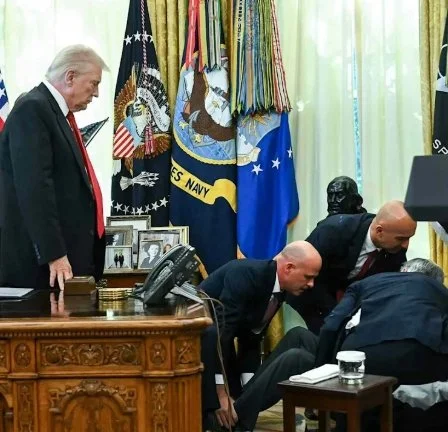Deceptive Military Tactics in Russian Geopolitics
A Psychological Perspective
In recent decades, Russian geopolitical strategies under President Vladimir Putin have frequently involved the use of ceasefire offers and military training drills as instruments of deception. These tactics have significant implications for international relations and security policies. Understanding these deceptive trends is crucial for policymakers, military strategists, and the global community to effectively respond to and anticipate Russian maneuvers. This article explores the psychological underpinnings of these tactics, supported by peer-reviewed research, and provides a comprehensive analysis of their application in various conflicts.
Deceptive Tactics in Russian Geopolitics
The Use of Ceasefires as Strategic Deception
Ceasefire offers, ostensibly aimed at reducing hostilities, have often been utilized by Russia to gain strategic advantages. This approach was notably evident during the Russo-Georgian War in 2008 and the ongoing conflict in Eastern Ukraine. By calling for ceasefires, Russia has been able to halt military engagements temporarily, allowing for the consolidation of gains and repositioning of forces.
Research on military deception highlights that such tactics are designed to create a false sense of security and manipulate the opponent's decision-making process (Whaley & Busby, 2016). Ceasefires serve as psychological tools, inducing complacency and reducing the perceived threat, which in turn hampers the opponent's readiness to counter sudden escalations (Simons, 2010).
Russo-Georgian War (2008): During this conflict, Russia repeatedly called for ceasefires while continuing to advance its positions. The offers of ceasefire were used to create confusion and disarm Georgian forces psychologically, making it easier for Russian troops to secure strategic areas.
Eastern Ukraine (2014-Present): Throughout the ongoing conflict, particularly in the Donbas region, Russia has often proposed ceasefires which were subsequently violated. These ceasefires provided opportunities for Russian-backed separatists to regroup and strengthen their positions.
Training Drills as a Cover for Military Buildup
Another prominent tactic involves the use of large-scale military training drills near strategic regions. These drills often serve as a cover for the accumulation of troops and equipment, facilitating rapid deployment when needed. The 2014 annexation of Crimea and the 2022 invasion of Ukraine exemplify this strategy. In both cases, Russia conducted extensive military exercises near the Ukrainian border, which later transitioned into full-scale military operations.
Psychological studies on threat perception suggest that such drills function as a form of strategic ambiguity, creating uncertainty about Russia's true intentions (Bar-Joseph & McDermott, 2017). This ambiguity can paralyze decision-making processes in adversary states, as they struggle to discern whether the drills are genuine training exercises or precursors to invasion.
Annexation of Crimea (2014): Russia conducted large-scale military exercises near the Ukrainian border as a pretext to amass troops. This buildup was later used to swiftly annex Crimea, catching both Ukraine and the international community off guard.
Invasion of Ukraine (2022): Prior to the full-scale invasion, Russia amassed a significant number of troops under the guise of military drills. Despite diplomatic negotiations and assurances, these forces were used to launch the invasion, demonstrating the deceptive nature of these exercises.
Psychological Underpinnings of Deceptive Tactics
Manipulation of Perception and Cognition
Deceptive tactics employed by Russia leverage psychological principles of perception and cognition. By offering ceasefires, Russia manipulates the opponent's perception of the conflict's status, leading them to believe that de-escalation is imminent. This can reduce vigilance and preparedness, making it easier for Russia to achieve strategic objectives with minimal resistance.
Similarly, the use of training drills exploits cognitive biases related to threat assessment. The repetitive nature of these drills can desensitize observers to the potential for actual military action, fostering a false sense of normalcy. When an actual invasion occurs, the element of surprise is enhanced, as the opponent's expectations have been effectively managed (Heuer, 1999).
Psychological Impact on International Community
These deceptive strategies also impact the international community's response to conflicts involving Russia. Offers of ceasefires and training drills often serve as tools of diplomatic manipulation, complicating efforts to build a unified response. The psychological effect is a form of strategic distraction, drawing attention away from Russia's aggressive intentions and creating divisions among potential responders (OECD, 2023).
Importance for International Observers
Understanding Russia's use of deceptive military tactics is crucial for international observers, including policymakers, intelligence agencies, military strategists, and international organizations. The significance of this understanding lies in several key areas:
Preventing Strategic Surprise
International observers play a vital role in preventing strategic surprise, which occurs when a nation or coalition is caught off guard by an adversary's sudden military actions. Russia's use of ceasefire offers and military training drills as deceptive tactics can create a false sense of security, leading to unpreparedness and strategic shock. By recognizing these tactics, international observers can maintain a heightened state of vigilance and readiness, reducing the risk of being caught unprepared by sudden Russian military movements.
Enhancing Diplomatic Responses
Russia's deceptive tactics complicate diplomatic efforts to resolve conflicts and manage international crises. Offers of ceasefires and large-scale training drills can be used to manipulate diplomatic negotiations and create divisions among international actors. When international observers are aware of these tactics, they can develop more informed and cohesive diplomatic strategies that account for the possibility of deception. This can lead to more effective and united responses, strengthening international resolve and reducing the likelihood of being misled by Russian maneuvers.
Improving Intelligence Analysis
Accurate intelligence analysis is essential for understanding the intentions and capabilities of adversarial states. Deceptive tactics, such as those employed by Russia, challenge traditional intelligence assessments by masking true intentions behind seemingly benign activities. International observers, particularly intelligence agencies, must incorporate an understanding of these deceptive practices into their analytical frameworks. This can improve the accuracy of threat assessments and enable more proactive measures to counter potential aggression.
Strengthening Military Preparedness
For military strategists and defense planners, recognizing Russia's deceptive tactics is critical for maintaining readiness and operational effectiveness. Training drills and ceasefire offers can lull opposing forces into a state of complacency, making them vulnerable to sudden attacks. By anticipating and preparing for these tactics, military forces can maintain a higher level of preparedness, ensuring that they are ready to respond rapidly and effectively to any unexpected developments.
Informing Public and Media
International observers also have a role in informing the public and the media about the deceptive tactics used by states like Russia. Public awareness can influence political will and support for necessary measures to counteract these tactics. By providing accurate information and analysis, international observers can help ensure that public discourse is informed and that democratic societies are resilient against manipulation and propaganda.
Implications for Policy and Strategy
To effectively counter these deceptive tactics, it is essential for policymakers and military strategists to develop a nuanced understanding of their psychological foundations. This includes:
Enhanced Intelligence and Surveillance: Continuous monitoring of military activities, even during declared ceasefires and training drills, to detect signs of deception.
Strategic Communication: Counteracting Russian narratives by clearly communicating the deceptive nature of their tactics to the international community.
Preparedness and Vigilance: Maintaining a high level of readiness and scepticism regarding Russian military movements, regardless of declared intentions.
Simply Put
The deceptive use of ceasefires and training drills in Russian geopolitical strategy is a sophisticated application of psychological manipulation. By understanding the underlying principles of perception and cognition that these tactics exploit, the international community can better anticipate and respond to Russian maneuvers. Future research should continue to explore the psychological dimensions of military deception to enhance the effectiveness of counter-strategies.
References
Bar-Joseph, U., & McDermott, R. (2017). Intelligence Success and Failure: The Human Factor. Oxford University Press. Intelligence Success and Failure - Paperback - Uri Bar-Joseph; Rose McDermott - Oxford University Press (oup.com)
Heuer, R. J. (1999). Psychology of Intelligence Analysis. Center for the Study of Intelligence. Pyschology-of-Intelligence-Analysis.pdf (cia.gov)
OECD. (2023). Disinformation and Russia’s war of aggression against Ukraine. OECD. https://www.oecd.org/ukraine-hub/policy-responses/disinformation-and-russia-s-war-of-aggression-against-ukraine-37186bde/
Simons, G. (2010). Mass Media and Modern Warfare: Reporting on the Russian War on Terrorism. Ashgate Publishing. Mass Media and Modern Warfare | Reporting on the Russian War on Terror (taylorfrancis.com)
Whaley, B., & Busby, J. S. (2016). Practise to Deceive: Learning Curves of Military Deception Planners. Marine Corps University Press. Practise to Deceive: Learning Curves of Military Deception Planners by Whaley, Barton: new (2016) | Front Cover Books (abebooks.co.uk)










